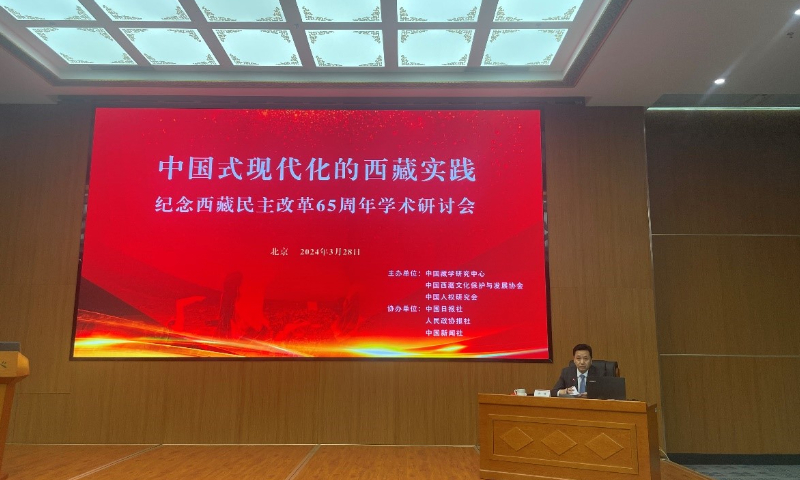Seminar held in Beijing to commemorate 65th anniversary of democratic reform in Xizang

A seminar on commemorating the 65th anniversary of the democratic reform of Southwest China's Xizang Autonomous Region was held in Beijing on Thursday, with scholars from China, Australia and Germany reviewing the epoch-making event of emancipation of 1 million serfs, and the region's miraculous development in various fields over the past 65 years. They also shared their views on Xizang's practice of Chinese modernization.
On March 28, 1959, people in Xizang launched democratic reform, freeing a million serfs. In 2009, the regional legislature announced March 28 as the day to commemorate the emancipation of the one million serfs.
Democratic reform in Xizang is the inevitable path of historical development and the urgent demand of all ethnic groups in the region. Xizang has made tremendous achievements in safeguarding human rights, with people of all ethnic groups enjoying extensive and full democratic rights, Wang Yanwen, deputy secretary general of the China Society for Human Rights Studies, said at the seminar.
Xizang has witnessed a comprehensive transformation in economic and social development, protection of religious freedom, preservation and promotion of excellent traditional culture, and comprehensive improvement in the legal protection of human rights, which also underscores the political advantages of the leadership of the Communist Party of China and the advantages of socialism with Chinese characteristics, said Wang.
The democratic reform in Xizang is a monumental historical event that propelled progress in human rights and social development in the region. It also stands as a landmark event in the history of human civilization and the advancement of global human rights, said Chen Zongrong, deputy director-general of the China Tibetology Research Center (CTRC).
Chen noted that commemorating this great event is crucial for distinguishing right from wrong, adhering to justice and fairness, clarifying misconceptions, refuting disinformation and exposing hypocrisy.
The expert noted that the Dalai Lama clique and overseas anti-China forces spare no effort in maliciously attacking the democratic reform in Xizang. They excessively glorify the social system of old Xizang, portraying the cruel, dark, barbaric, backward, and authoritarian old Xizang as a paradise on earth. They label the armed rebellion instigated by the upper class in old Xizang, led by the Dalai Lama, to resist democratic reform as an "anti-oppression uprising," which is a complete distortion of truth and a betrayal of conscience.
The Dalai Lama clique and overseas anti-China forces turn a blind eye and a deaf ear to the region's economic, social, and human rights development. Their relentless attacks fully expose their hypocritical faces, said Chen.
Commemorating the democratic reform in Xizang is related to advancing social progress in the region and demonstrating full confidence in promoting long-term stability and high-quality development in Xizang through the comprehensive advancement of Chinese modernization, according to Chen.
Scholars attending the Thursday seminar also systematically reviewed the enormous achievements made in Xizang's economic and social development.
They noted that for the past 65 years, Xizang has experienced leapfrog development in its economic and social sectors. The living standards of all ethnic groups in the region have significantly improved, and there has been a notable increase in the happiness and sense of fulfillment among the residents.
The Tibetan Plateau has witnessed prosperous economic development, comprehensive social progress, a favorable ecological environment, and increased happiness among the people. Xizang's development has entered its best period in history, said the scholars.